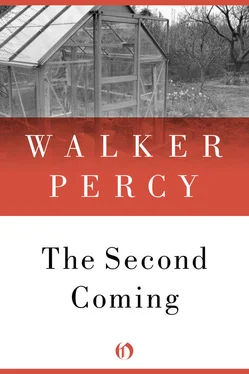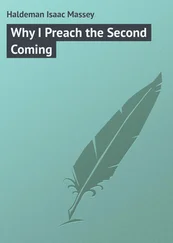Something stirred in him. He looked at his watch. In three minutes Kitty would slip out into the cloud. When he thought of her standing in the summerhouse, hugging herself, wrapped in fog, he smiled. Then she would sit on the damp bench, straddling slightly, her thighs broadening and filling the creamy linen skirt. Yes, it was in her, not in a mirror, he would find himself. Entering her, he would be answered, responded to, delineated. His life would be proved by her. She would echo him, print him out, trace his shape like radar. He could read himself in her.
His heart gave a big pump. Did Kitty want what she appeared to want? Did she want him to fuck her in the summerhouse? Yes! And it was Kitty’s ass he wanted. Yes! He blinked in astonishment. It was as if he had forgotten about women, about loving women, about having a woman’s ass or loving a woman, one woman, one’s own heart’s love, love her heart, mind, soul, sweet lips, ass and all. A violent shiver took hold of him; hairs on his arm raised. What was he afraid of? of being caught? that he shouldn’t? that he couldn’t?
Heart beating in his neck, he hurried down the back stairs to the garage — and fell. Either fainted or fell, or slipped and fell, and knocked himself out, or perhaps had a fit, one of his “petty-mall” spells. Fit or fall, it seemed to him that he drifted down weightlessly, careening softly off the walls of the stairwell, and fetched up comfortably at the bottom of the steps. If he had been knocked out, he must have come to instantly, in decent time to collect himself, not get up but arrange himself in a sitting-lying position on the bottom step.
There was a sound. Someone had entered the garage.
The narrow stairwell was dark. The bright cloud seemed to fill the garage. He could see the three cars and most of the floor without being seen.
Methodically he felt his arms and legs and clenched his fists. Had he had a stroke? Would he have to carry one fisted hand in the other like a baby? No, his hands worked. Something wet and warm ran into the orbit of one eye. He touched his cheek. It was blood. Above, at his temple, rose a clotted swelling. Though it seemed to be growing larger, it didn’t hurt.
The cat sat in its usual place under the Rolls. Tendrils of fog drifted across the clean floor. The light from the cloud struck the concrete at such an angle that he could make out the faint arcs of the mason’s trowel. The fog crept under the Mercedes, where it vaporized and disappeared. Perhaps there was a faint warmth in the motor.
He noted with curiosity that there seemed to be no hurry, that there was all the time in the world, time to take account of small events in the garage. More important, it had become possible to take stock of himself, assess the extent of his injuries, and make his plans accordingly. Curious! Suddenly he had come into himself like the cat, got rid of the ghost which stood aside from himself, forever rushing ahead or hanging back. Here he was in the real world of cats and concrete! He smiled. Perhaps something had been knocked loose in his head. Or perhaps something loose had been knocked together.
Someone had come from behind the Rolls and was standing over him. Leaning on one elbow, he cocked his head to look up.
“Lawyer Barrett?”
“Yes?”
It was Ewell McBee.
“Lawyer Barrett, I needed to tell you something.”
“You already told me. You apologized for the shot. Don’t worry about it,” he said dreamily. Ewell loomed against the white cloud. As he shaded his eyes with one hand to see him better, he noticed that Ewell’s head silhouetted against the whiteness showed a slight hollowing at the temple oddly like his own. And when he turned his head, there was a familiar snoutishness about the nose.
“I needed to ask you something.”
Ewell did not seem to find it remarkable that he was lounging in the dark stairwell.
In his strange new mood he made the following observation: people notice very little indeed, ghost-ridden as they are by themselves. You have to be bleeding from the mouth or throwing a fit for them to take notice. Otherwise, anything you do is no more or less than another part of the world they have to deal with, poor souls.
You worry about what you are supposed to do. The funny thing is, no matter what you do, people believe it is no more or less than what you are supposed to do.
“I’m going to make you a proposition you can’t turn down, haw haw,” said Ewell. He hawked, spat, hiked a foot up on the Mercedes bumper, settled his crotch.
“Your video-cassette company? How much do you want me to invest?” He seemed to understand everything Ewell said before he said it. He tried to stand but something was wrong with his left leg; it gave way. It was possible to resume his lounging position in such a casual way that Ewell did not seem to notice.
“I want you to hear about it from my potner,” said Ewell, placing one hand softly on the Mercedes hood. “We going to have us a little party tonight. At my villa. A private screening of her latest film. It’s called Foxy Frolics and it’s a winner, I guarantee. Just me and my potner and you and her leading lady. She’s actually a wonderful girl named Cheryl Lee from Chapel Hill and she’s as smart as she can be. What she really wants to do is play the violin for the Appalachian symphony. She’s into erotic movies for the money. What she really is a musician. What talent! The party is her idea. She wants to meet you. For some reason she thinks you’re the smartest and sexiest man she ever saw. I told her you were as dumb as me, just richer, har har.”
A rushing black tide seemed to be filling one end of the garage. When he closed one eye, then the other, it did not go away. But when he turned his head a little to confront it, the wall of darkness retreated.
Ewell hawked. “We can have us a party. First I make us some toddies like your daddy used to make, then Norma Jean will cook us a steak, then we’ll show the film and I promise you you’ll have the finest time you ever had. Cheryl is a little armful of heaven, but she is also smart. You and me understand each other, don’t we?”
He cocked his head, the better to see the looming figure of Ewell McBee, the slightly hollow temple, the snoutish nose. It seemed strange to hear Ewell, who once was a bully and jerk-off artist who wore bib overalls and had thick white country-white skin talking about “films” and “screening” and being “into” this and that.
But he was only half listening. He tested the strength of his hands, moved his legs. I believe I can walk after Ewell leaves. The rushing darkness had fallen back. Is it a tumor or stroke or what? he wondered. It did not seem to matter. The newfound core of calmness and freedom seemed safe from such things, even from the tide of darkness trembling at the corner of his eye.
Unhurriedly he began to listen to Ewell, who was talking about his, Will Barrett’s, father.
“He was the smartest man I ever knew and he would bet on anything. He would bet you five dollars a mockingbird would sit still while he hit a niblick out of the sand.”
Yeah, that’s real smart.
“He would always give me ten dollars after a round — that was a lot then. Once I was caddying for him and Judge Pettigrew and Senator Talley and an insurance man and I heard him buy a one-million-dollar life-insurance policy, just like that.”
That was real smart too. Buy a million-dollar life-insurance policy, then scatter your brain cells over the state of Mississippi.
“I never will forget one thing he told a preacher. One time they had a preacher in the foursome. A big famous preacher from Montreat. I could tell he was getting on your daddy’s nerves. He couldn’t cuss. The preacher kept talking about his church, how much money he took in, and saving souls, ten thousand souls in this one church in Charlotte. Oh the soul this and the soul that, praise the Lord and so forth. Your daddy didn’t say a word. But he was getting hot under the collar. Then he said something to the preacher I will never forget. You know what he said?” Ewell hawked and hiked himself.
Читать дальше












